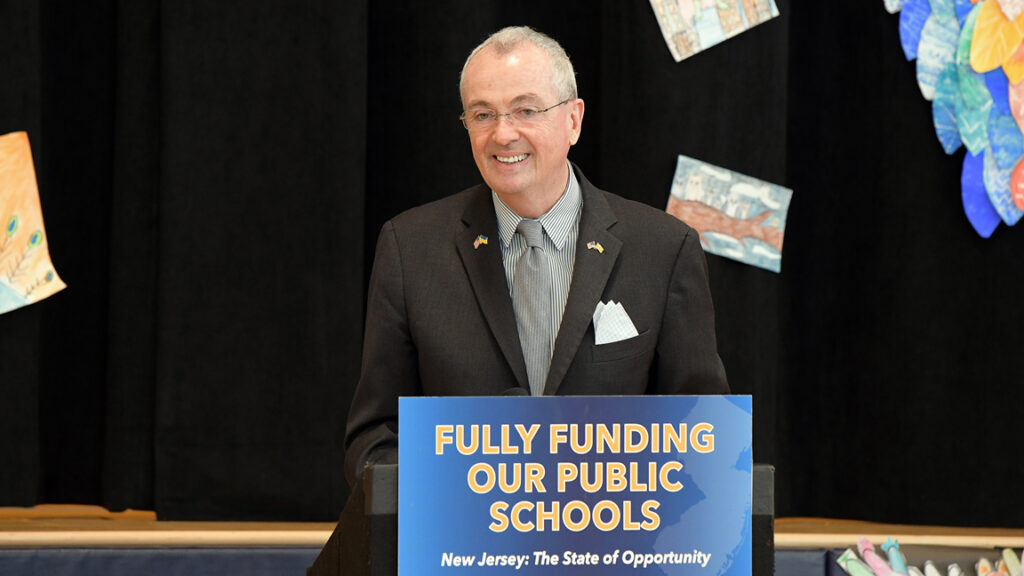Gov. Phil Murphy announced a record increase in public school funding in Tuesday's budget speech, but that doesn't mean every school district will see an increase in state aid.
The Department of Education has released details of the amount of state aid each school district will receive in the 2025 fiscal year, which begins July 1. The budget is now before Congress for a mandatory review before the start of the new financial year. It will be the first organization to fully fund the state's school funding system, increasing public school funding by $908 million to $11.7 billion. The move marks the end of a seven-year phase-in of the school funding reform bill that Murphy signed in 2018.
For most districts, that means more aid from Trenton, such as an increase of more than $100 million for Newark, the state's largest district. Plainfield, where Murphy announced an increase in overall funding Thursday, is expected to see an increase of about $30 million.
While approximately 420 districts will see an increase in state subsidies from the previous year, approximately 140 districts are expected to see a reduction.
As with previous phase-ins, some school districts are facing significant layoffs, which could lead to cuts in staff and programs. School leaders and lawmakers said they are looking for ways to minimize the impact on students and staff, from providing additional aid to school districts to allowing property tax increases of more than 2%.
“It's very frustrating. Districts across the state are getting unexpected numbers. This is the wrong way this system is run and it's very unfair to school districts. We're right back where we started. ,” said Sen. Andrew Zwicker (D-Hunterdon).
Zwicker co-sponsored a bill last year that would provide additional aid to some districts facing deep cuts in state funding. He said similar legislation could be introduced this year.
Tax increases may close the gap
Zwicker also introduced a bill that would allow certain districts facing year-over-year funding cuts to raise property taxes above the 2% cap without voter approval. The bill passed the Senate Education Committee with bipartisan support, and Zwicker said he would seek a full vote in the next Senate vote.
“We need to come up with a solution quickly,” Zwicker said. “While long-term solutions are needed, we must address the immediate response and ensure that no student in any school district has to endure these devastating cuts.”
Sen. Declan O'Scanlon (R-Monmouth) said in a statement that “leftover pork” from the last budget session should be used to protect teachers and students from unnecessary budget cuts. .
“While some school districts have not been hit as hard as others, S2 fluctuations have left far too many districts without sufficient resources to maintain critical programs and extracurricular activities.” O'Scanlon said, referring to the abbreviation of the funding formula.
Zwicker said the districts he has talked to have already made as many cuts as possible while the fiscal reform bill is being phased in. Only essential programs and staff, including teachers, should be cut now, he said. South Brunswick, for example, had to cut some bus routes last year, even though it received additional aid to lessen the impact of the cuts.
Hillsborough Township Public Schools is facing cuts that are 10 times greater than expected based on prior budget projections, Superintendent Mike Volpe said. He said he expected a cut of $250,000, but he was surprised to learn that the district was expected to see more than $2.7 million in aid cuts.
“It's very difficult to understand where this came from without any notice,” Volpe said. “We are having a hard time getting answers from anyone as to why the cuts are so large.”
He said the cuts would be devastating for his district, which has already seen about $7 million in cuts in recent years. Shrinking the budget will require cuts to staff and key programs, he said.
Volpe said the district had already cut about 50 certified employees, but rehired about 20 through a ballot referendum that brought more funding to the district.
uneven results
“We are moving closer and closer to being a district that complies with the state's minimum regulations,” Volpe said. “At the end of the day, we're going to have to do the bare minimum that the state requires while other districts are adding resources.”
Volpe said it's time for lawmakers to reconsider how school funding works, with input from school superintendents. Some leading lawmakers, including Education Committee Chairman Sen. Vin Gopal (D-Monmouth), say overhauling the formula is a priority.
“The work has to start now,” Zwicker said. “Otherwise, we're just wasting our work. We know there's a problem and we have to deal with it. The sooner the better.”
Majority Leader Sen. Teresa Ruiz (D-Essex) also expressed openness to reconsidering the school funding formula in an interview with New Jersey Spotlight News after Murphy's budget speech.
“What I'm hoping for is [acting Education Commissioner] “Kevin DeMar brings a level of expertise when we're talking about school funding formulas,” Lewis told New Jersey Spotlight News on Tuesday. Demmer joined Rutgers University in 2022, where he worked for 15 years. Now he's back and at the helm.
Sen. Paul Sarlo (D-Bergen) said any changes should wait until the next governor takes office.
“I don't think we need to make any changes until then,” Sarlo told NJ Spotlight News after his budget speech. “I believe we should hold the line for the remainder of this governor’s term.”
Mr. Murphy cannot run again and has more budget cycles left in his term than this one.
— Graphics: Colleen O'Dea


